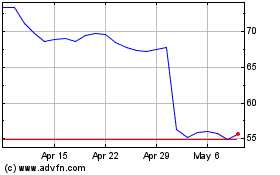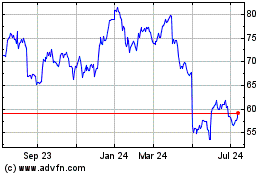CVS, Walgreens Say Drug Prices Are Easing After Years of Ballooning -- Update
January 04 2018 - 2:53PM
Dow Jones News
By Sharon Terlep
After years of surging U.S. drug prices, the two largest
drugstore companies said some pricey prescription medicines are
becoming more affordable.
CVS Health Corp. and Walgreens Boots Alliance Inc. said Thursday
that their pharmacy revenues are taking a hit from an increase in
generic alternatives, particularly for some expensive specialty
drugs, along with slowing price inflation for name-brand
medications.
"You're going to see continued dampening going forward as you
think about the pipeline of generics coming into the markets," said
CVS finance chief Dave Denton, who didn't discuss specific
products.
Lower prices will dent the company's revenue, but ultimately
could lead to increased profits because generics generally have a
higher margin than name-brand drugs. "The introduction of generics
can really dampen the top line but affect the bottom line in a
positive way," Mr. Denton said.
Prices for generic medicines fell sharply last year as
wholesalers competed for business by discounting them. Meanwhile,
some pharmaceutical firms raised branded prices at a slower rate
than previous years to avoid sparking further scrutiny from
lawmakers in Washington.
Some of the most eye-popping prices are for cancer treatments
and genetics-based therapies that aren't sold through
drugstores.
Just this week, Spark Therapeutics Inc. said it would charge
$850,000 per patient for a pioneering new treatment for a
hereditary form of vision loss.
CVS, which also owns Caremark, a large pharmacy benefit manager,
forecast low single-digit revenue growth in 2018 and
operating-profit growth of 1% to 4%. The figures don't factor in
CVS's planned acquisition of health insurer Aetna Inc. The company
aims to close the $69 billion deal in the second half of this
year.
CVS said it expects claims volume in its pharmacy-services
segment to grow by 8% in 2018, with revenue rising a slimmer 1.5%
to 3.5% due largely to cheaper drugs. Walgreens, meantime, said
U.S. pharmacy sales rose nearly 9% by volume in the most recent
quarter, while revenue increased 7.4%.
Alex Gourlay, Walgreens co-chief operating officer, in a call
with analysts, said the company has been seeing drug-price
deflation due to in introduction of generics.
Walgreens, which also has operations in Europe, said the
increase in prescription volumes helped lift U.S. pharmacy sales in
its latest quarter. Comparable retail sales, which includes general
merchandise and personal-care items, fell 0.9%.
Regulators recently approved Walgreens's $4.38 billion deal with
Rite Aid Corp. to buy 1,932 of Rite Aid's stores, but the deal was
smaller than originally anticipated because of regulatory concerns.
The company had initially offered $9.4 billion to buy Rite Aid,
which would have expanded its store count by 4,600 stores.
Walgreens shares initially jumped Thursday on its latest results
but then fell after Rite Aid reported quarterly results that
included a decline in store sales and a decrease in the number of
prescription sales. Walgreens shares were down nearly 5% to $71.82
in afternoon trading, while CVS rose 3% to $75.43.
Write to Sharon Terlep at sharon.terlep@wsj.com
(END) Dow Jones Newswires
January 04, 2018 14:38 ET (19:38 GMT)
Copyright (c) 2018 Dow Jones & Company, Inc.
CVS Health (NYSE:CVS)
Historical Stock Chart
From Aug 2024 to Sep 2024

CVS Health (NYSE:CVS)
Historical Stock Chart
From Sep 2023 to Sep 2024
